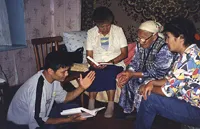The Kalmyks number about 200,000. They live in the Republic of Kalmykia in southern Russia. The Kalmyk language belongs to the Mongolian language family. The Kalmyks are Buddhists.
Nina gathers elderly Kalmyk women and reads to them from the Kalmyk NT. “Often they say ‘You speak about a Russian God – we are Buddhists, we have our own belief.’ But when I speak to them in Kalmyk and read from the New Testament, they listen with interest. A woman, 99 years old, said ‘If Jesus Christ is a God who forgives sins, then I want to become a Christian!’ The Kalmyks need to hear God’s Word in their mother tongue in order to understand that God is also their God and not only the God of the Russians.”
“When we distribute the Kalymk New Testament in villages we read out the most important passages about the birth, death and resurrection of Jesus Christ, and also from Revelation where it states that peoples of every country and language shall one day pray to the Lord,” Nina says. “Most of the Kalymyk people know Russian, but they say: ‘When we read in our language we receive God as our own, but when we read in Russian then Jesus Christ is a Russian God.’”
“Twice a month we travel to a man and read the New Testament with him. Once when we arrived he was waiting impatiently for us. He pointed to the Gospel of Luke that lay open on the table. ‘Look, here it says that a man should not hate his enemy but should love him.’ He told us that it had been a shock to discover this. He had thought about it for several days and then finally decided that if it was in the Holy Scriptures then it had to be right. He was to go to a wedding where he knew that he would meet a bitter enemy with whom he had intended to settle an account. He went to the wedding and after some inner struggles he approached his enemy and offered him his hand. It felt as if a great weight had been lifted from the old man’s heart.”

